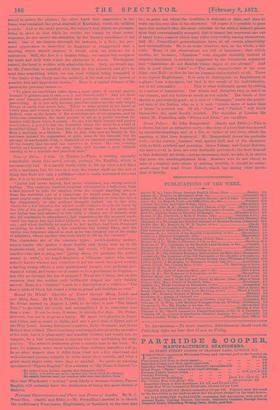be ; to point out where the tradition is deficient
or false, and then to work out his own idea of the character. Of course it is possible to pass upon this author's idea the same criticism as the author himself passes upon that conventionally accepted, that it cannot but represent one out of many types, some of which may differ very widely among themselves. Still Mr. Francillon's generalisations have, at all events, plausibility and verisimilitude. He is an acute observer, and, on the whole, a fair critic. Many of his observations are full of keenness ; that which credits, for instance, "Jonathan" with singular credulity instead of singular sharpness, is certainly supported by the formidable argument that "charlatans do not flourish where dupes do not abound." And this is good about "John" :—" The main characteristic of the true John—not Bull—is that he has no common characteristic at all. There is no typical Englishman. It is easy to distinguish an Englishman at a glance from a foreigner, but that is the result of his individuality,
not of his nationality This is what Goldsmith meant by calling us a nation of humourists. Our minds and thoughts vary as much as our climate, and our bodies as much as our minds." The whole of this sketch is particularly good ; so is that of "Giuseppe," where the practi- cal tarn of the Italian, who, as it is said, "thinks more of taxes than of ideas," is pointed oat. Of all, "Juan" and "Patrick" will think themselves the most hardly treated. The sketches of London life which Mr. Francillon calls "Fauna and Flora " are excellent.


































 Previous page
Previous page